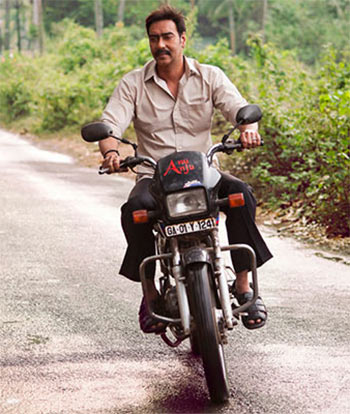 Several parts of Drishyam work but the film is more tackiness than craft, says Raja Sen.
Several parts of Drishyam work but the film is more tackiness than craft, says Raja Sen.
Some movies appear on our viewing doorstep carrying far too much baggage.
Drishyam, for instance, is a Hindi remake of a Malayalam film of the same name made into several languages with leading men of exceptional pedigree, and which has also, I believe, stolen its set-up from a Japanese mystery thriller, The Devotion Of Suspect X.
That’s an awful lot of suitcases all right.
As with too-eager houseguests, there are ways for filmgoers (and critics) to deal with such visitors, and in this particular case I decided against homework, invited the film in and asked it to leave its luggage out by the door.
I’m glad I did, because while I haven’t watched any of the other Drishyams or read Suspect X, this Hindi version is an utterly unremarkable thriller, one that could have been potentially cool and wily, but one that falls well short of being memorable.
It’s a depressingly ordinary film, and the allegedly stolen plot -- about a crime being covered-up -- is something we’ve seen many, many times before.
Heck, if you want to see a genuinely great thriller about a movie-inspired protagonist buying tickets and meeting people to construct a watertight alibi, go watch Sriram Raghavan’s fantastic Johnny Gaddar instead of reading the rest of this review.
Ordinariness aside, Nishikant Kamat’s Drishyam is watchable and even builds tension effectively from time to time.
But it ends up an overlong, overbaked drudge, largely because of Ajay Devgn in the lead, trying to look cerebral and calm while assuming solid-coloured shirts will absolve him of the artlessness he has flaunted in recent movies.
It would be unfair to compare most leading men to masters Mohanlal and Kamal Haasan, but Devgn -- who used to be a striking brooder, a man who appeared to know how to simmer on the inside -- is now just talking softly while essentially swaggering along regardless.
Vulnerability? Perish the thought.
The idea of subtle internalisation has led this man to sheer cardboard.
The way the film sees him doesn’t help.
Even while playing an everyman who loves his family, a song montage in Drishyam has Devgn standing away from his wife and daughters, wearing sunglasses and striking a hero pose till the family comes and coos over him.
(Later in the same sequence his wife tries on heels and slips; Devgn sits back and laughs, making no effort to help her.)
Devgn’s Vijay is a cable-operator who lives in a giant villa with a fawning family, and one day things go quite bizarrely awry.
Something must be done to save his world, and Vijay -- a film-lovin’ orphan who prefers spending most nights with a tiny TV in his office instead of his moronically indulgent wife -- takes inspiration from the movies.
Except, and here is one fundamental problem with this meta film-within-film setup, he doesn’t really do or learn anything of actual brilliance, with films having apparently taught him the mere value of being stubborn.
There are times he gets a lump in his throat watching Bachchan ham it up hard or one in his trousers watching Sunny Leone do the same, but it all appears too forced.
Save for a couple of scenes, the cinema-beats-life trope doesn’t really pay off.
What does pay off, as always, is casting Tabu in a meaty role.
Despite first showing up in a bewilderingly tight police shirt -- which then leads to her striding through a corridor in slow-motion, almost a la Baywatch -- the actress is characteristically impressive in her role of a no-nonsense cop.
There’s a case, she has a stake in it, and she knows what she’s doing -- something Tabu expresses with brilliant weariness as she rolls her eyes at her husband who objects to her brutal methods.
She’s a badass superstar who looks like she means it when she munches over dialogue about ‘visual memory’ et al, but her epiphanies are too conveniently arrived at, while her methods are too thickheaded.
Drishyam starts far too snoozily.
The narrative intent is clear -- to normalise the world (and Devgn) before shifting into thriller-mode -- but the film is clumsily written, with dialogue that sounds wooden; the first hour of the film sounds like an amateurishly dubbed film instead of one we’re watching natively.
There are a few smart flourishes, but the filmmakers linger on the one or two good twists for so long that they render them tedious. (There is even a cheeky reference to Suspect X, I believe, in the throwaway mention of a “retired professor†who lives nearby.)
But mostly there is more tackiness than craft, demonstrated best by the ill-produced recreations of the movies Vijay watches and in the way fake newspapers are visibly made up of computer printouts with Times New Roman taken too literally.
Don’t get me wrong, several parts of the film work and, for the most part, Drishyam motors along far more efficiently than most Hindi films -- but isn’t that too low a bar?
Is it too much to ask for a ingenious, tight thriller?
At one point in the film Tabu makes the link about Vijay and the movies, and this is where I rubbed my hands together and thought we were (finally) in for some intriguing traps that subvert or mock cinematic cliché, a truly brilliant cat and mouse game.
Alas, nothing comes of it and we never get a battle between equals.
Perhaps because she’d have eaten him alive, lug, luggage and all.
Rediff Rating:Â 
